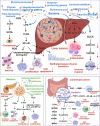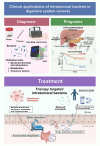Unravelling the role of intratumoral bacteria in digestive system cancers: current insights and future perspectives
- PMID: 38849871
- PMCID: PMC11157735
- DOI: 10.1186/s12967-024-05320-6
Unravelling the role of intratumoral bacteria in digestive system cancers: current insights and future perspectives
Abstract
Recently, research on the human microbiome, especially concerning the bacteria within the digestive system, has substantially advanced. This exploration has unveiled a complex interplay between microbiota and health, particularly in the context of disease. Evidence suggests that the gut microbiome plays vital roles in digestion, immunity and the synthesis of vitamins and neurotransmitters, highlighting its significance in maintaining overall health. Conversely, disruptions in these microbial communities, termed dysbiosis, have been linked to the pathogenesis of various diseases, including digestive system cancers. These bacteria can influence cancer progression through mechanisms such as DNA damage, modulation of the tumour microenvironment, and effects on the host's immune response. Changes in the composition and function within the tumours can also impact inflammation, immune response and cancer therapy effectiveness. These findings offer promising avenues for the clinical application of intratumoral bacteria for digestive system cancer treatment, including the potential use of microbial markers for early cancer detection, prognostication and the development of microbiome-targeted therapies to enhance treatment outcomes. This review aims to provide a comprehensive overview of the pivotal roles played by gut microbiome bacteria in the development of digestive system cancers. Additionally, we delve into the specific contributions of intratumoral bacteria to digestive system cancer development, elucidating potential mechanisms and clinical implications. Ultimately, this review underscores the intricate interplay between intratumoral bacteria and digestive system cancers, underscoring the pivotal role of microbiome research in transforming diagnostic, prognostic and therapeutic paradigms for digestive system cancers.
Keywords: Digestive system cancers; Functions; Intratumoral bacteria; Mechanisms; Therapeutic strategy.
© 2024. The Author(s).
Conflict of interest statement
All authors declare no competing interests related to this review.
Figures



References
-
- Wang S, Zheng R, Li J, Zeng H, Li L, Chen R, et al. Global, regional, and national lifetime risks of developing and dying from gastrointestinal cancers in 185 countries: a population-based systematic analysis of GLOBOCAN. Lancet Gastroenterol Hepatol. 2024;9:229–37. doi: 10.1016/s2468-1253(23)00366-7. - DOI - PMC - PubMed
Publication types
MeSH terms
LinkOut - more resources
Full Text Sources

